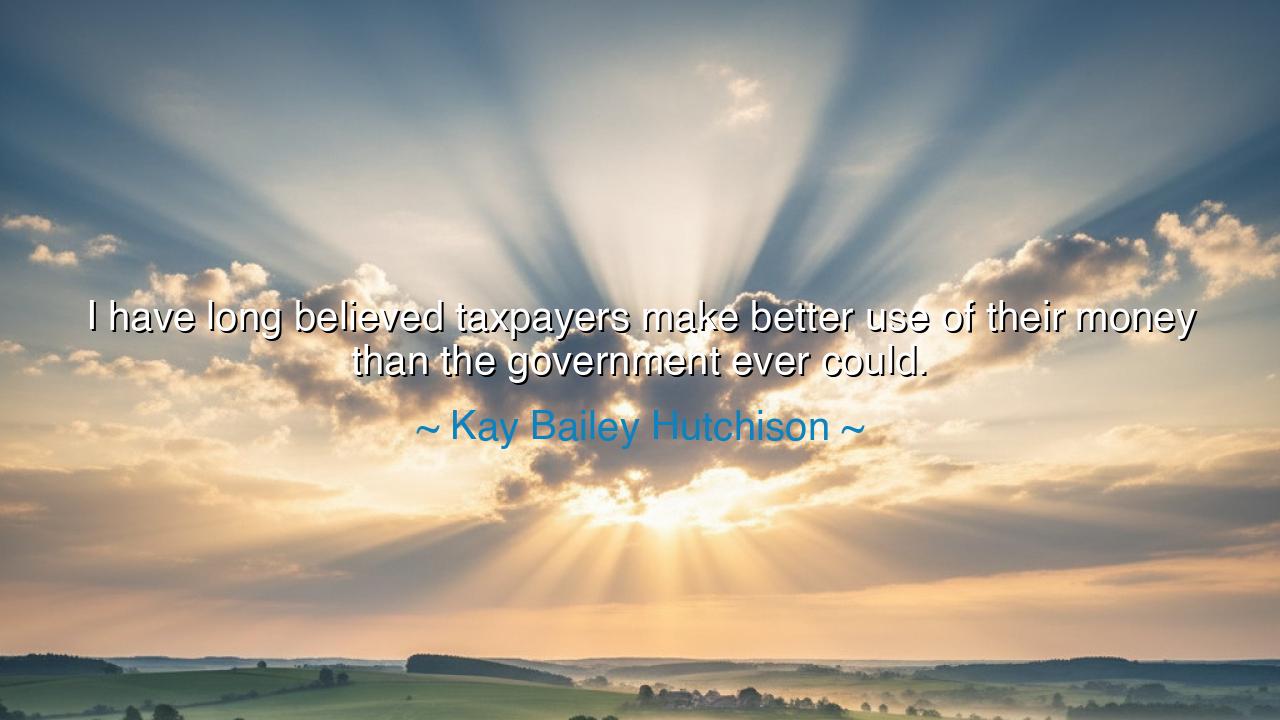
I have long believed taxpayers make better use of their money
I have long believed taxpayers make better use of their money than the government ever could.






In the halls of governance and the marketplaces of ordinary life, where wealth is earned with sweat and taken with silent levies, Kay Bailey Hutchison, a stateswoman of sharp intellect and tempered wisdom, once declared: “I have long believed taxpayers make better use of their money than the government ever could.” These words, though spoken in the calm cadence of policy, ring with a moral force that transcends politics. They speak of faith — faith in the individual’s capacity to build, to create, and to act with responsibility, and a deep skepticism toward the slow, impersonal hand of bureaucracy that spends the fruits of others’ labor. It is a truth both ancient and enduring: that freedom is inseparable from stewardship, and that those who earn must also have the right to decide how their labor is used.
The origin of this quote lies in Hutchison’s long career as a U.S. Senator from Texas, where she became known for her advocacy of fiscal restraint and limited government. She witnessed, as many before her have, how governments often grow fat on the wealth of their people — how taxation, meant to serve the common good, can become a mechanism of inefficiency and excess. In her time, as in ours, budgets swelled with good intentions but produced little of lasting virtue. Every dollar sent to Washington was a dollar removed from the farmer’s field, the craftsman’s bench, the mother’s table. Hutchison’s belief arose from this simple and eternal observation: that those who labor know best how to spend the fruits of their labor, and that prosperity flows not from decree, but from the freedom to choose.
This principle has been tested in every age of civilization. When the Roman Empire was at its height, the state taxed its citizens not merely to defend the realm, but to feed an ever-growing bureaucracy, to fund spectacles, and to maintain the comfort of its elite. The people, burdened by levies they could not escape, saw their independence shrink while the government’s appetite grew. The farmers left their land, trade declined, and innovation withered under the weight of regulation. Rome, which once thrived on the enterprise of its citizens, decayed into dependency and corruption. The lesson was clear: when the state consumes what the people could have used to build their own prosperity, it devours the spirit of the nation itself.
Hutchison’s words remind us that government, by nature, spends without the discipline of ownership. The taxpayer must earn, save, and sacrifice, feeling the weight of every coin; the bureaucrat merely allocates, detached from consequence. What is spent by millions of hands with care and creativity becomes, in the machinery of government, an ocean of waste — a system where effort is divorced from reward. Her statement is not a condemnation of governance, but a warning against the illusion that central authority can replicate the wisdom of countless free individuals making their own choices. To trust the government more than the citizen is to forget that the government itself is merely an extension of the citizen’s consent.
The truth of her words shines in the story of postwar America, when millions of veterans returned home after World War II. Instead of waiting for the government to rebuild the economy, they built it themselves — opening small businesses, buying homes, sending their children to school. The prosperity of the 1950s did not come from bureaucratic design but from the unleashed energy of a people free to direct their own earnings. In every town and city, the taxpayer proved Hutchison’s belief true: the individual, not the state, is the wellspring of growth. The government could pave roads, but it was the people who built lives upon them.
Her philosophy, however, also carries a moral burden. To say that taxpayers make better use of their money is to assume that they act with responsibility and foresight. Freedom, if squandered, becomes its own undoing. Thus, her wisdom challenges not only the government but the citizen. If we would keep our wealth from wasteful hands, we must also prove worthy of its stewardship. Let every man and woman, therefore, live with the discipline of the wise and the charity of the just — investing not only in themselves but in their communities, remembering that self-reliance does not mean selfishness.
The lesson, then, is one of balance and vigilance. Government has its purpose — to protect, to defend, to preserve justice — but when it reaches too far into the lives of the people, it weakens the very virtue it was meant to protect. A free nation must trust its citizens more than its officials, and its citizens must, in turn, live as stewards of that trust. The taxpayer’s dollar is sacred not because it is wealth, but because it represents work — the hours, sweat, and sacrifice of a human life. To waste it is a kind of injustice; to guard it is an act of freedom.
So let these words of Kay Bailey Hutchison endure as both reminder and call: “Taxpayers make better use of their money than the government ever could.” Let every generation remember that the prosperity of nations is not built by programs, but by people; not by mandates, but by minds; not by rulers, but by the ruled. Guard your freedom with wisdom, and spend your resources with conscience, for in doing so, you uphold the oldest law of civilization — that the greatest wealth of a nation lies not in its treasury, but in the hands and hearts of its free citizens.






AAdministratorAdministrator
Welcome, honored guests. Please leave a comment, we will respond soon